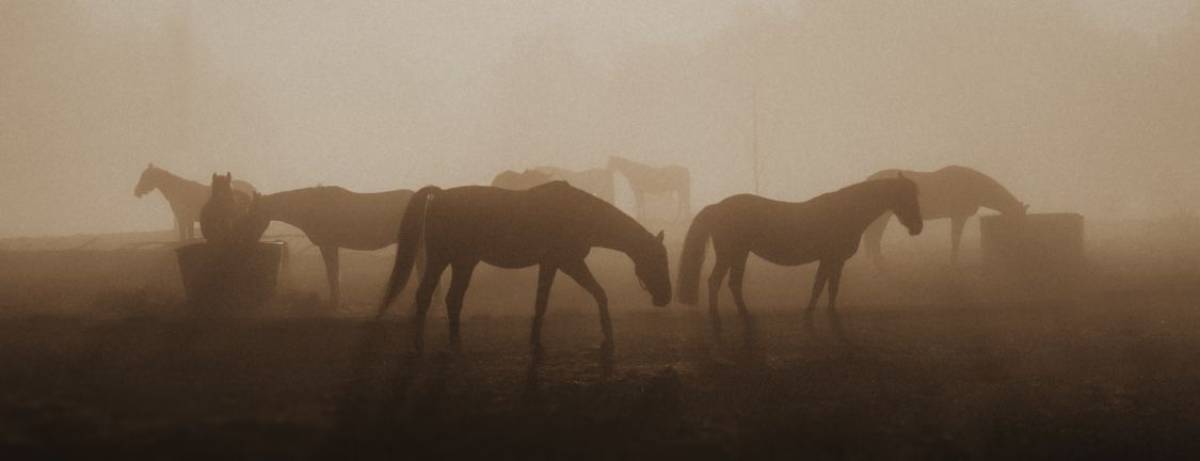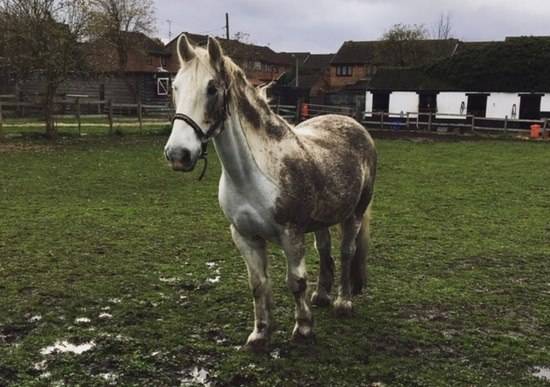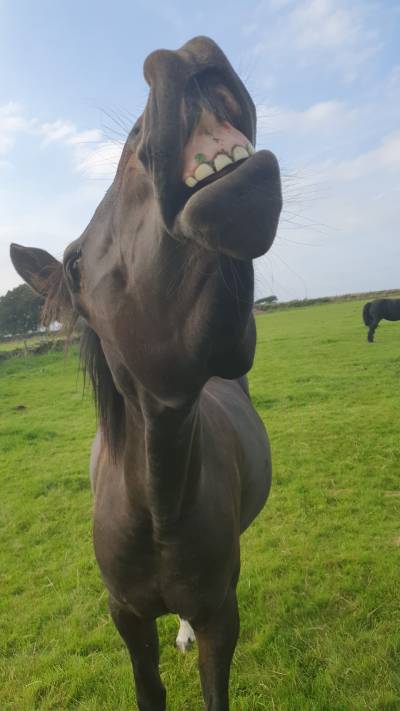
Have you ever wondered what it means when your horse curls their top lip, eats mud or paws at the ground?
We investigate ten of the most common horse traits to help you figure out what your horse could be telling you. Before we get into the nitty-gritty, we recommend speaking to your vet or an equine professional if your horse’s behaviour suddenly alters or your notice subtle changes that could indicate something more serious is going on.
In terms of our sources for this article, we’ve looked into advice from well-known natural horseman Warwick Schiller, consulted Equine Nutritionists and looked into research from the Royal Veterinary college. The below advice is not stapled in law, it’s here to serve as a guide to help you establish why your horse could be doing certain things:
Why does my horse eat mud?
Dirt is a natural part of the equine diet. It contains minerals in bio-available form that the horse needs for various metabolic functions so eating dirt is quite normal for horses . However , keep an eye on the level of dirt consumption as it could be due to boredom , an upset stomach, or lack of structural fibre . If your horse’s muzzle is constantly covered in dirt, it might be time to speak to an Equine N utritionist about what your horse could be lacking in their diet.
Why do horses roll?
Horses often roll when they feel relaxed and safe. Some horses love to roll and will roll in a muddy puddle or as soon as they get in their stable. As the seasons change it also helps them shed their coat . If you horse is rugged, rolling excessively can mean your horse is too hot and by rolling they’re trying to cool off. Not sure what rug your horse should be wearing? Click here to check out our handy guide!
If you notice your horse is rolling more frequently than normal it could be a warning sign of belly ache – horses roll to try and ease pain and move the gas and fluid pain. You know your horse better than anyone else so learn to recognise normal versus worrying rolling behaviour.

Why does my horse curl his upper lip?
This is called the Flehmen response – raising and stretching the neck while curling the upper lip and exposing teeth. Horses, as well as cats, rhinos and hedgehogs have this as a response to help their sense of smell.
Raising their upper lip increases the flow of air through their nostrils which widens the scent openings behind their teeth on the upper palette. Perfumes and lotions on human hands can cause this and stallions will often demonstrate this behaviour when examining a mare to find out if she is in heat. It’s generally nothing to raise concern and is simply your horse absorbing a new smell. Make sure you have your camera at the ready as the flehmen response can be the source of humerous photos!

Why does my horse keep chewing wood?
This is usually a sign of a lack of fibre in your horse’s diet. It can also indicate boredom if your horse is stabled for long periods of time or in a field with limited forage.
Some horses chew out of habit, they’re a bit like mischievous kids and will try what other “kids” in the yard are trying – then the habit sticks. Like all habits, it can be broken. Turn out with access to forage or spray your wood with bitter-tasting solutions to break the cycle. And again if the behaviour starts out of the blue, seek expert advice to find out if there is a cause for it.
Licking and chewing in horses
It is generally believed that a horse starts licking and chewing to signal they are in a relaxed state. The lick/chew reflex indicates a release of stress or tension and in most instances, it occurs when the horse has "survived" a stressful encounter and lets the stress go. In some cases, the horse may have been concentrating on a problem, thinks it has found a solution and the lick/chew reflex indicates the release of concentration tension. Most often it merely indicates that some stressful pressure has ceased. So if you’re doing groundwork with your horse or teaching them a new trick, keep an eye out for licking and chewing as this could indicate that they have absorbed the information you presented them with.
The same can be said if your horse is having treatment from an equine professional – licking and chewing could signal a release of muscle tension in the area being worked on so keep an eye on this during the next visit from your physio.
What does it mean when my horse follows me?
You’ve connected to your horse – this is great news and it’s a huge compliment – they like you! Horses are herd animals and will follow the leader in the herd. If your horse follows you, it’s a sign they respect you and feel comfortable letting you take the lead.
My horse insists on biting rugs – why?
If your horse can reach the rugs hanging outside the stable he is probably biting them due to habit. Horses, like humans, are creatures of habit and if something familiar is left within reach while they’re stabled overnight, they’ll more than likely see it as their mission to play with it while they can.
This sort of behaviour probably happens an hour or so before you arrive to feed breakfast. If the rug is getting ripped, it might be best to find somewhere else to keep your horse rugs. And if your horse is biting other horse’s rugs when they’re wearing them, it’s probably nothing more than playful behaviour. Horses groom one another when they’re out and also have the odd nip – this behaviour doesn’t stop just because a horse is wearing a rug. So, some horses might seem to make it their mission to remove other horse’s rugs or take a chunk out of them, the likelihood is that they don’t do this on purpose – the main issue here is the expense in mending or replacing the rug!
What does it mean when a horse is pawing at the ground?
There are many reasons why a horse may be pawing at the ground – it may be bored or restless, playful, anxious, stressed or simply seeking attention – once you understand why your horse is pawing you can assess whether it is something that needs addressing.
Many young horses paw at the ground to seek attention or to be playful and often a horse will paw while eating to show they’re enjoying their food. If the pawing is unusually aggressive or highly repetitive this could be a sign of something more sinister, such as stomach pain or distress. Reasons your horse could be pawing at the ground:
- Attention
- Pain - When your horse is in pain, they cannot tell us, so pawing is their way of communicating this.
- Boredom - Pawing from boredom can become a bad habit and so you should make sure there are plenty of things to do such as toys or a companion if your horse is stabled for long periods of time.
- Nervousness - When nervous, your horse may paw at the ground over and over in a quick fashion.
- Anger or frustration - Being tied up or stabled for a long period of time can cause your horse to become angry or frustrated, leading to pawing at the ground.
- Showing dominance - If your horse arches the neck and a front leg is held straight out while pawing, it is usually a show of dominance
- Hunger - If your horse is hungry and waiting for food, pawing may be done to get attention
My horse puts its ears back
Even though horses have been domesticated for thousands of years, most of their natural behaviour has remained intact, s ome horses put their ears back more than others and it isn’t always a case for concern. It is always a good idea to rule out any medical issues as it could be a sign your horse is in pain. With a clear bill of health , it could be that this is how your horse shows they are anxious, scared or just trying to assert their dominance. Some horses do it at feed times and for others it might just be their default setting. Keep an eye on how often they pin their ears back and if it becomes more and more common there might be some behavioural changes you can make to keep your horse happy.
Why does my horse bite me?
Some horse bite with intent and this can be a show of dominance. However , for some horses biting and nipping can be a sign they’re trying to interact with you. If you watch a herd of horses, you’ll soon see that this is how they interact with one another and it’s not always a violent interaction. Warw ick Schiller believes that when a horse is being mouthy with you, they’re actually trying to engage with you. Watch this video to see how Warwick deals with a nippy horse:
A horse biting with intent or aggression could mean they’re not happy with their current situation – this can range from a piece of tack that is uncomfortable to feeling threatened or anxious. Again, it’s important to know what’s normal for your horse, some horses do flatten their ears and threaten to bite and that can be their normal behaviour. For others it could be unusual and a sign they’re trying to tell you something.
Finally, remember that you know your horse better than anyone. Get to know what’s normal and what’s not. Look for external and internal factors that could trigger the change in behaviour and if you’re at all worried speak to your vet or equine professional about the behaviour.
We’d love to hear from you on the above topics, have you successfully managed to stop your horse biting? Or maybe you have worked on connection with your horse and now they follow you around the arena at liberty? Let us know in our Harry Hall One Club Group on Facebook.
